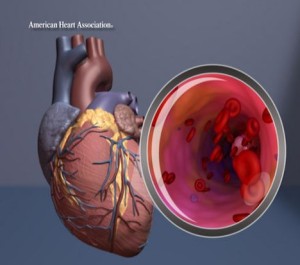
Heart graphic with magnifier on artery (American Heart Assn.)
Post-traumatic stress disorder (PTSD) may decrease the ability of blood vessels to dilate, raising the risk of heart attack and stroke in veterans, according to new research in the Journal of the American Heart Association.
In the largest study to date on the impact of post-traumatic stress disorder (PTSD) on blood vessel health, researchers found that blood vessels of veterans with PTSD were unable to expand normally in response to stimulus – they were less reactive — compared to veterans without PTSD. Less reactive blood vessels are linked to heart disease and other serious conditions.
“Traditional risk factors such as high blood pressure, diabetes, high cholesterol and smoking, have not fully explained why people with PTSD seem to be at higher heart disease risk. Our study suggests that chronic stress may directly impact the health of the blood vessels,” said Marlene Grenon, M.D., lead author of the study and associate professor of surgery at the University of California San Francisco and vascular surgeon at the Veterans Affairs Medical Center San Francisco /Veterans Affairs Medical Center-Surgical Services.
Among veterans being treated at the Veteran’s Affairs Medical Center in San Francisco researchers used a standard test, flow-mediated dilation (FMD), to gage how well an artery in the arm relaxes and expands in response to the squeezing of a blood-pressure cuff. They compared the FMD scores of 67 veterans (average age 68, 99 percent male) with PTSD and 147 veterans (average age 69, 91 percent male) without PTSD. The presence of PTSD was defined as a score of 40 or higher on the PTSD Symptom Checklist. They found:
- Veterans with PTSD had significantly lower FMD scores – their blood vessels expanded 5.8 percent compared to 7.5 percent among the veterans without PTSD – indicating a less-healthy response in the lining of their blood vessels.
- Aside from PTSD, lower scores on the FMD test were also linked to increasing age, worse renal function, and high blood pressure.
- Veterans with PTSD were more likely to be male and to be diagnosed with depression, but less likely to be taking ace-inhibitors or beta-blockers to treat high blood pressure.
- After adjusting for differences in age and the presence of other conditions and treatments, PTSD itself was still very strongly associated with blood vessels that were less able to dilate.
The study only included veterans; but PTSD can also occur in non-veterans as a reaction to experiencing or observing a terrifying event, such as warfare, natural disasters, sexual assault, other physical violence or trauma. People with the condition may experience prolonged anxiety, flashbacks, nightmares and many other life-altering symptoms. The disorder is estimated to affect 7.7 million people in the United States according to the U.S. Department of Health and Human Services National Institutes of Health.
“We need to determine better ways we can help people manage PTSD and other types of stress to reduce the negative impact of chronic stress on blood vessels. At the Veterans Administration in San Francisco, we are in the process of starting a multi-disciplinary vascular rehabilitation clinic to try to better manage traditional and non-traditional risk factors including stress, to improve cardiovascular health,” Grenon said.









Please consider the following as a front page article on Post Traumatic Stress Disorder –
The Transcendental Meditation program has been endorsed by the U.S. Department of Veterans Affairs (VA) for over 20 years for soldiers with PTSD.
Kindly watch and share with all –
“PTSD and Transcendental Meditation – David George, Infantryman” (2:34;https://www.youtube.com/watch?v=6ki4c-XkYsM / excellent!)
and
“Transcendental Meditation Improves Performance at Military University” (5:12;https://www.youtube.com/watch?v=oIH0913lQe0 )
Also see, “Use a Treatment for PTSD That Actually Works” in The Hill, Washington DC
http://thehill.com/blogs/congress-blog/healthcare/262340-use-a-treatment-for-ptsd-that-actually-works
and
“Transcendental Meditation May Reduce PTSD Symptoms, Medication in Active-Duty Personnel” in EurekAlert (01/11/16)
http://www.eurekalert.org/pub_releases/2016-01/mcog-tmm011116.php
Thanks!
Bill @ BillsArtBox.com
P.S. Please visit http://www.operationwarriorwellness.org/ for more information.
Note: Results are available for long-standing PTSD symptoms, as well, including for Vietnam Veterans.
Also, see the dramatic effects for Domestic Post-Traumatic Stress Disorder for women and children, and for PTSD for “First Responders”, at http://www.davidlynchfoundation.org/#video=6gM_sXiUPvo (5:24)
Also, from http://www.army.mil/ :
“Transcendental Meditation – a Path to Healing”
“Doctors promised him through medication and hard work he could potentially heal over the course of years, but since transcendental meditation he has moved much closer to achieving his recovery in months.”